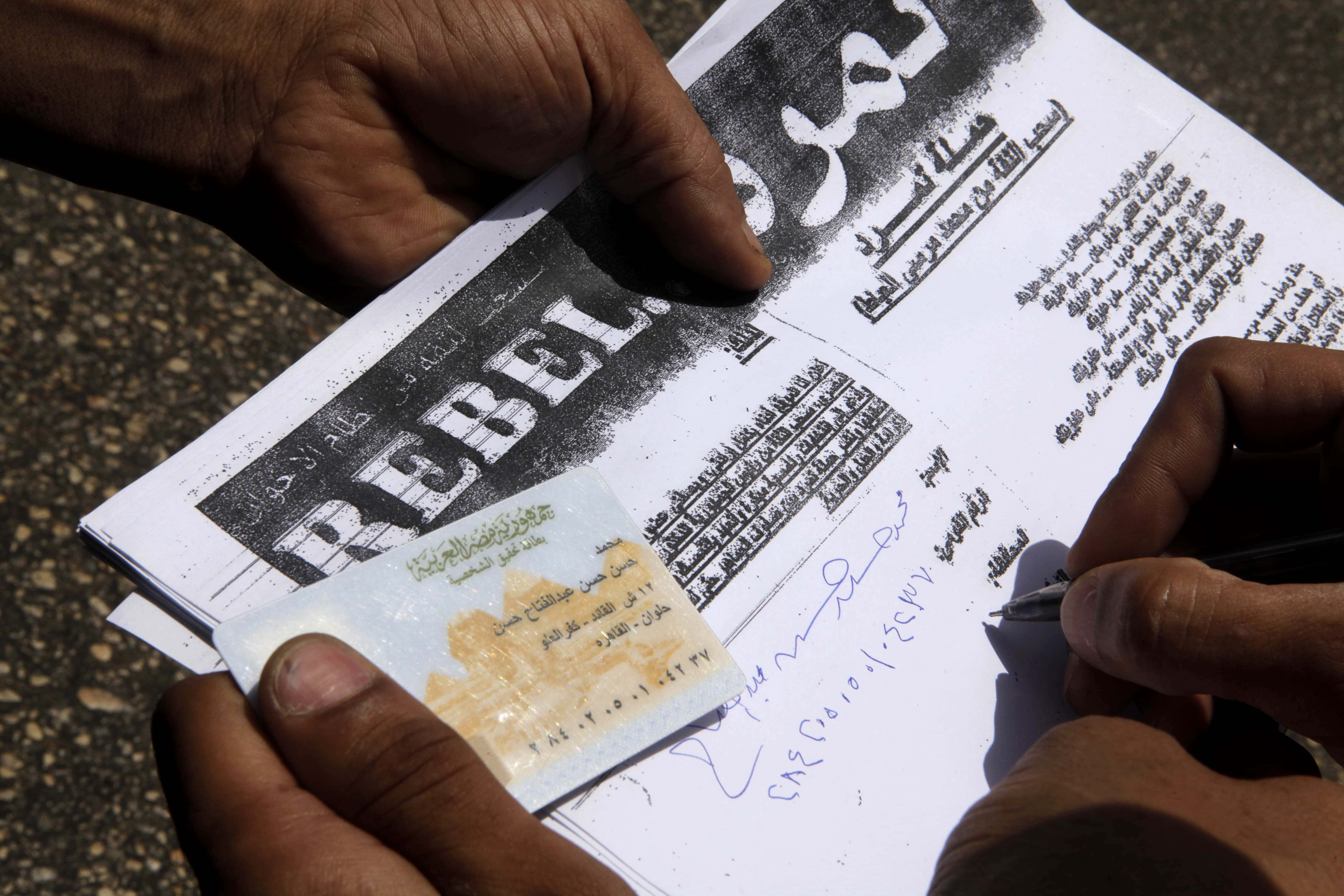A campaign called ‘Tamarod’ has already gathered millions of signatures calling for the ousting of Egyptian president Mohamed Morsi revealing a growing discontent with the country’s first post-revolution president
A campaign titled ‘Tamarod‘ (the Arabic word for rebellion), calling for the fall of President Mohamed Morsi, is quickly gaining momentum in Egypt. The brainchild of the country’s ‘Kefaya’ (which means enough in Arabic) movement — the petition calling for Morsi’s ouster has had more than 7.5 million signatures to date. The campaign’s organisers say they hope to gather 15 million signatures by 30 June, the first anniversary of Morsi’s inauguration. They have also called for a mass protest in front of the Ittihadeya Presidential Palace the same day, in efforts to pressure Morsi into stepping down from the presidency and call for early presidential elections.
Scores of youth volunteers have been standing on busy street corners in Cairo’s affluent Zamalek and Mohandesseen neighbourhoods, urging commuters to sign the petition highlighting Morsi’s failure to deliver on his campaign promises of improving the economy, narrowing the country’s economic divide, and restoring security on the streets. Curious drivers and pedestrians stop to read the leaflets, bringing traffic to a standstill as supporters of the campaign chant anti-government slogans, and flash victory signs.
“The response to the campaign has been overwhelming . Egyptians are growing increasingly frustrated with the faltering economy , soaring prices of basic commodities, the fragile security situation and persistent power cuts, ” said Naglaa Bakr, a Mohandesseen resident and housewife, who had just signed the petition. “Morsi has to go”, she added.
The popular movement has now begun to draw support different factions in Egypt’s fractured opposition. As the campaign picks up steam, members of the Egyptian Federation of Trade Unions, the Dostour (Arabic for constitution) Party, the Social Democratic Party, the Free Egyptians, the 6 April youth movement, and the Journalists’ Syndicate have lent their support.
Morsi, meanwhile, appears to be unthreatened by the initiative, saying that he “welcomes free expression as long as it is within a legal framework.” Prominent Muslim Brotherhood member Mohamed Al Betaguy dismissed the campaign as an “opinion poll”, and cast doubt on whether or not the organisers could turn the petition into mobilisation. The Salafi Al Nour party has also slammed the initiative, calling it “illegal and unconstitutional.”
In response to Tamarod, Morsi’s Islamist supporters have launched their own campaign called ‘Tagarod’ — the Arabic word for impartiality. Tagarod’s leaders say that theirs is “an initiative to support legitimacy”, accusing Tamarod of aiming to destabilise the country and spread chaos. Tagarod’s founder, Assem Abdel Maged, is confident that his campaign would garner more signatures than those of Tamarod. Abdel Maged, who is also a member of the Jama’a Islamiya group, aims to use his own petition to prove that there are more Egyptians rallying behind the Islamist President than his opponents. The Tagarod campaign has also vowed to organise a million-man march to show solidarity with Morsi.
“The campaigns accentuate the secular-Islamist divide in the deeply polarised country. Tensions are building up ahead of protests planned for 30 June”, said Hadia Abdul Fattah, a Tamarod campaign member, who has been gathering signatures in the northeastern city of Damietta.
In recent weeks, several members of the Tamarod campaign have faced detention for distributing the petition on or near university campuses in Cairo, Sohag, and Zagazig. The targeted campaigners were forced to sign documents stating that they would no longer distribute Tamarod petitions, or take part in political activities on campus. In March, the Supreme Council of Universities banned political activities on campuses, under the pretence of ending violence between different political groups.
Some have warned that a crackdown on the movement could spark the kind of civil unrest that Morsi has been trying to avoid. Opposition activists say they will no longer tolerate any kind of repression, and vow to continue to protest until their demands are met.
Even if the campaign fails to reach its 15 million signature goal, activist and human rights lawyer Tarek Moawad told Index that the initiative highlights the crisis of legitimacy facing Morsi, and sends a clear message that Egyptians will not be silent about injustice. Morsi’s usage of Mubarak-era tactics to silence critics — whether it’s targeting journalists or the green light given to Islamist supporters attacking opposition activists — is a sign of the government’s weakness and vulnerability, he added.
Some analysts have also suggested that Egypt’s liberal opposition could use Tamarod to their advantage, by galvanising support for the liberal opposition in the upcoming parliamentary elections in October.
“If the political opposition can close ranks and adopt a unified stance, Tamarod may have the potential to boost gains for the secularist opposition which has so far failed to organise,” said Dr. Mostafa Kamel El Sayed, Professor of Political Science at Cairo University.

An Egyptian woman signs a leaflet for the campaign Tamarod that seeks to withdraw confidence from Egypt’s President in Cairo on 16 May 2013(AP Photo/Nasser Nasser)



